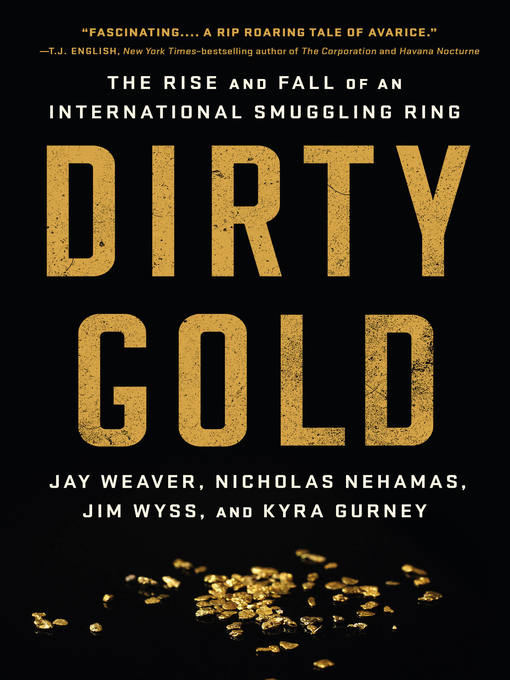
Dirty Gold
The Rise and Fall of an International Smuggling Ring
کتاب های مرتبط
- اطلاعات
- نقد و بررسی
- دیدگاه کاربران
نقد و بررسی

Starred review from January 18, 2021
In this shocking true crime epic, the four investigative journalist authors take a deep dive into the case of three Miami businessmen who built a multibillion-dollar smuggling empire that touched several continents and opened U.S. law enforcement’s eyes to yet another avenue of immorality. From 2013 to 2016, Juan Pablo Granda, Renato Rodriguez, and Samer Barrage used their company, NTR Metals, to smuggle over $3.6 billion in illegally mined gold into the U.S. The NTR Metals case drew international condemnation for its role in exploiting a lesser-known illicit economy that rivals the cocaine and blood diamond trades in terms of harm to the countries of origin: dirty gold comes from an industry in which criminals use toxic chemicals and destructive mining practices to rip the precious metal from the Andes and Amazonian riverbeds, destroying whole ecosystems and poisoning impoverished communities. The authors take the reader beyond the sensational multiagency investigation to provide a comprehensive exploration of the international precious metal trade to show how a criminal enterprise can thrive with a product where melting can erase all traces of origin easier than documents can be forged. This is a must-read for fans of Matthew Hart’s Diamonds and Roberto Saviano’s ZeroZeroZero. Agent: David Patterson, Stuart Krichevsky Literary.

March 1, 2021
Journalists Weaver, Nicholas Nehamas, Jim Wyss, and Kyra Gurney have expanded their Miami Herald series into a comprehensive expos� of the South American gold industry. Three gold brokers in Miami, Juan Pablo Granda, Pedro David P�rez Miranda, and Renato Rodriguez (the "three amigos"), went on a Peruvian gold-buying frenzy in the Amazon for their parent company, NTR Metals, by colluding with locals to falsify documentation and skirt compliance laws. This "dirty gold" results in ecological devastation, since mercury is used to pull gold from the soil, and miners are often forced to work in perilous conditions. When Peruvian authorities cracked down, the operation moved to Chile, Bolivia, and Colombia, and Granda, Miranda, and Rodriguez continued to buy Peruvian gold that had been smuggled out. This story celebrates some big wins: some of the major players were convicted, are serving time, and are on the hook for large fines; the investigation involved cooperation between several international agencies; and prosecutors were able to sentence illicit gold brokers by charging them with money laundering. The book is extensively researched and vividly told; readers might be mentally casting a film adaptation while reading. VERDICT An important book that will enlighten readers about the disturbing impact of gold mining in the Amazon--and hopefully rouse them to action.--Karen Sandlin Silverman, Mt. Ararat Middle Sch., Topsham, ME
Copyright 2021 Library Journal, LLC Used with permission.

March 1, 2021
A deep dive into a landmark U.S. prosecution of players in the transnational illicit gold trade. The co-authors, all journalists who have worked at the Miami Herald, closely examine the grim, little-understood world of artisanal (small-scale) gold mining, rife with malfeasance, corruption, and ecological devastation, stretching from developing nations like Chile and Peru to Miami, where precious-metal conglomerates like Elemetal sought to dominate the gold market, particularly after the 2008 recession. The narrative follows a broad cast of businessmen, smugglers, and brokers, all of whom realized that shipping illicit Chilean gold through neighboring countries would enable ready sales to firms (Elemetal and others) using forged origin documents. The authors focus on the "three amigos," macho, self-taught traders employed by Elemetal's subsidiary, NTR Metals, who were eager to bend the rules and who tracked their smuggling and money laundering on phone apps, which later incriminated them. This misbegotten white-collar-crime story unfolds against a well-rendered historical background of how such activities have fractured the fragile environments and societies of developing nations in Latin America, where remote regions have been overrun by chaotic, destructive artisanal mining. "For Peruvian criminals," write the authors, "gold had become far more lucrative than cocaine." Eventually, however, the FBI and federal prosecutors built an in-depth prosecution of the scheme, endeavoring to "lay out a vivid portrait of illegal mining, gold smuggling, and money laundering across two continents, one that captured the widespread environmental damage to the Amazon rain forest and the powerful role of drug traffickers." The authors write with a journalistic yet culturally attuned voice, but the narrative is sometimes repetitive in its frequent juxtaposition of the brutal conditions in the mine-ravaged rainforests with the wealth and colorful backstories of the key players as well as the determination and diligence of the various law enforcement agencies involved. An authoritative consideration of "dirty" gold's grip on the environment and role in rampant geopolitical corruption.
COPYRIGHT(2021) Kirkus Reviews, ALL RIGHTS RESERVED.

























دیدگاه کاربران